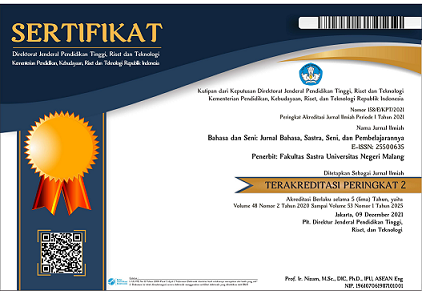REPRESENTASI BUDAYA DALAM MITOS AMUNGME
Abstract
The study aims to describe the type, meaning, function, and strategy of the mythology of Amungme, an ethnic group in Papua. The study is based on an assumption that the underlying concept of the Amungme mythology is the source of its conflict. The research design was based on the hermeneutics model of Schleiermacher, Dilthey, dan Richoeur. The study used quotations from the tales of the Amungme’s myth, attitudes of the Amungme people, statements from the resource persons of the Waa valley, and some written documents as the sources of data. Hermeneutical circle model was used to analyze the data. The result of the study shows that (1) the Amungme myth text contains human endogeonic, cosmogonic, eschatoic, languagenic, and animagenic types; (2) the three represented relations in the Amungme myth text are human-God, human-human, and human-nature relationships; (3) the myth has mystical, cosmological, sociological, and pedagogical function; (4) the legacy is passed on to the following generations based on the normative principles of the “three-generation speaking pattern”. The findings inform policy makers in development, ecology, and eduation in Papua, especially in the district of Amungsa.
Full Text:
PDFRefbacks
- There are currently no refbacks.

This work is licensed under a Creative Commons Attribution 4.0 International License.

Dear Sir/Madam
We appreciate your continued confidence and trust in Bahasa dan Seni: Jurnal Bahasa, Sastra, Seni, dan Pengajarannya (JBS). In order to enhance the service, readability, and quality of JBS publications, we will be transitioning to a new website, https://citeus.um.ac.id/jbs, in collaboration with Digital Commons (Elsevier) starting in July 2024.
Sincerely
Yusuf Hanafi
(Editor in chief)















2.png)